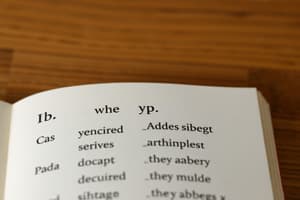Podcast
Questions and Answers
Which of the following sentences correctly uses the present tense of the verb 'to be'?
Which of the following sentences correctly uses the present tense of the verb 'to be'?
- He is happy today. (correct)
- The dogs was barking loudly.
- They is going to the party.
- She am a teacher.
What is a correct example of using the past tense of the verb 'to be'?
What is a correct example of using the past tense of the verb 'to be'?
- I am at the park.
- We were excited yesterday. (correct)
- They are late last week.
- She is kind.
Which statement best describes the importance of the verb 'to be' in English grammar?
Which statement best describes the importance of the verb 'to be' in English grammar?
- It is primarily used in future tense constructions.
- It is an action verb that denotes physical activity.
- It is foundational for constructing a wide range of grammatical structures. (correct)
- It is only used in questions.
Identify the incorrect subject-verb agreement in these sentences.
Identify the incorrect subject-verb agreement in these sentences.
Which sentence demonstrates a correct use of the verb 'to be' for describing a characteristic?
Which sentence demonstrates a correct use of the verb 'to be' for describing a characteristic?
Which of the following sentences incorrectly uses the verb 'to be' in a future tense context?
Which of the following sentences incorrectly uses the verb 'to be' in a future tense context?
In which example is the verb 'to be' used to express location?
In which example is the verb 'to be' used to express location?
Which of the following forms is NOT a tense variation of the verb 'to be'?
Which of the following forms is NOT a tense variation of the verb 'to be'?
Flashcards
Verb 'to be' forms
Verb 'to be' forms
The different ways the verb 'to be' changes for different tenses and persons (e.g., am, is, are; was, were; been, being).
'to be' Present Tense
'to be' Present Tense
The forms of 'to be' used to describe things happening now (e.g., 'I am happy').
'to be' Past Tense
'to be' Past Tense
The forms of 'to be' used to describe things happening in the past (e.g., 'She was tired').
Subject-verb agreement ('to be')
Subject-verb agreement ('to be')
Signup and view all the flashcards
Existence with 'to be'
Existence with 'to be'
Signup and view all the flashcards
Location with 'to be'
Location with 'to be'
Signup and view all the flashcards
Characteristics with 'to be'
Characteristics with 'to be'
Signup and view all the flashcards
Common 'to be' Tense Errors
Common 'to be' Tense Errors
Signup and view all the flashcards
Study Notes
Introduction to the Verb "To Be"
- The verb "to be" is a crucial, auxiliary verb in English grammar.
- It's used to indicate existence, state of being, or a condition.
- It's not a purely action verb; it describes a state, a way of being, or a condition.
Forms of the Verb "to be"
- The verb "to be" has different forms depending on the tense and the person.
- Present tense: am, is, are
- Past tense: was, were
- Past participle: been
- Present participle: being
Uses of the Verb "to be"
- Indicating existence: This is the most fundamental use.
- Example: "I am a student." (Describes a state of being; the student's qualities)
- Example: "The cat is on the mat." (The cat occupies a certain space)
- Describing characteristics:
- Example: "She is kind." (Describes a quality or characteristic)
- Example: "The flowers are red."
- Expressing location:
- Example: "My house is in the city."
- Example: "The book was on the table."
Tense Variations
- Present tense: Often used for general truths, habits, or ongoing situations.
- Example: "The earth is round."
- Example: "I am studying English."
- Past tense: Used to describe something that happened in the past.
- Example: "Yesterday, I was at home."
- Example: "The sun was shining."
- Future tense: While not directly using "to be," its forms can help construct future tenses, often with "will be" or "going to be."
- Example: "I will be studying."
- Example: "They are going to be late."
Common Errors
- Incorrect use of subject-verb agreement regarding the verb "to be." Always match the subject (singular or plural) to the correct conjugated form of the verb.
- Example: "The dog is (correct) / are (incorrect) happy."
- Example: "The children are (correct) / is (incorrect) happy."
- Incorrect use of tenses, especially mixing past and present tenses.
- Example: "He is going to the store yesterday." (incorrect tense)
Importance in English Grammar
- This verb is used to construct a wide range of sentences, including simple statements, complex sentences, indirect questions, and others.
- It's foundational for understanding and constructing a majority of grammatical structures in the English language. Its presence or absence can alter the sentence's meaning significantly.
Auxiliary Verb Function
- The verb "to be" often serves as an auxiliary verb, helping to form other tenses like the present perfect ("I have been here"), past perfect ("I had been there"), and future perfect ("I will have been there").
- It's also essential for other sentence structures, especially passive voice.
Studying That Suits You
Use AI to generate personalized quizzes and flashcards to suit your learning preferences.




